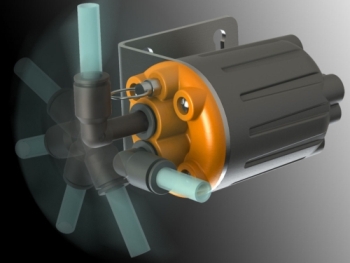Apr 16 2013
Conceptually different than any other inline refractometer available, the patented IRIS™ (Intelligent Refractive Index Sensor) line introduced today by MISCO, represents a new standard for inline concentration measurement.
 MISCO IRIS Inline Sensor. (PRNewsFoto/MISCO)
MISCO IRIS Inline Sensor. (PRNewsFoto/MISCO)
The modular design includes a flow-through adapter with two push-to-connect input/output ports and integrated mounting bracket. With just a quarter-turn, the detachable smart-sensor can be removed from the adapter for cleaning and maintenance; no tools are necessary.
Since IRIS is a true smart-sensor, all the intelligence for processing and communication is performed by the IRIS sensor itself, so no external control unit is necessary. The sensor, about the size of jumbo-sized egg, is easy to install and maintain. Simply fasten the mounting bracket, which is integrated into the flow-through adapter, to a fixed surface, then insert 5/16" (8 mm) plastic or metal tubing into the input and output ports on the face of the adapter, and finally connect the power/communication cable.
There is an abundant supply of readily available off-the-shelf fittings for adapting the IRIS to nearly any type of process, including hose barb adapters, Y-connectors, size reducer/enlargers, Swagelok fittings, and threaded adapters for NPT, BBSPT, BSPP pipe. Two right-angle adapters, included with the sensor, allow for flexible installation and permit the tubing to come from any angle or direction.
Refractive index is related to the speed at which light passes through a substance, and is the basis of IRIS measurements. Once the refractive index of a solution has been determined, the sensor, which is programmed with one of thousands of different scales from the extensive MISCO scale library, converts the measurement into a more user-friendly unit of measure such as percent concentration by weight or volume, specific gravity, density, freeze point, boil point, or nearly any other physical property of interest.
The sensor communicates, through its power/communication cable, directly with a PLC, computer, process controller, HMI, SCADA, or other data capture system. Users can select from a variety of communication options including 4 to 20 mA or 0 to 10 volt analog output, as well as RS232 digital output on some models. The sensor is easily configured and calibrated by connecting it to the USB port on a Windows® computer equipped with the accompanying software application.
The rugged IP68 sensor features a precision ground sapphire optic, the next hardest substance to diamond, providing a virtually scratch-proof optical interface between the sensor and the process fluid. It is designed for years of trouble-free service in industrial environments.
"IRIS represents a new standard in refractive index sensing and is only a fraction of the cost of other inline/process refractometers," said Michael Caminer , from the MISCO marketing group. "Never before has it been this simple to install and operate a concentration sensor."
The IRIS sensors, along with MISCO's other inline refractometers, are made in the USA. More information on IRIS, and other inline/process refractometers, can be found on the MISCO website at www.misco.com/inline
Video Reference: https://www.youtube.com/watch?feature=player_detailpage&v=BgoYtZ3Bgms
https://www.youtube.com/watch?feature=player_detailpage&v=s_5THa5M_Jg